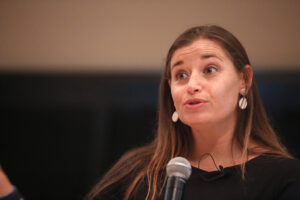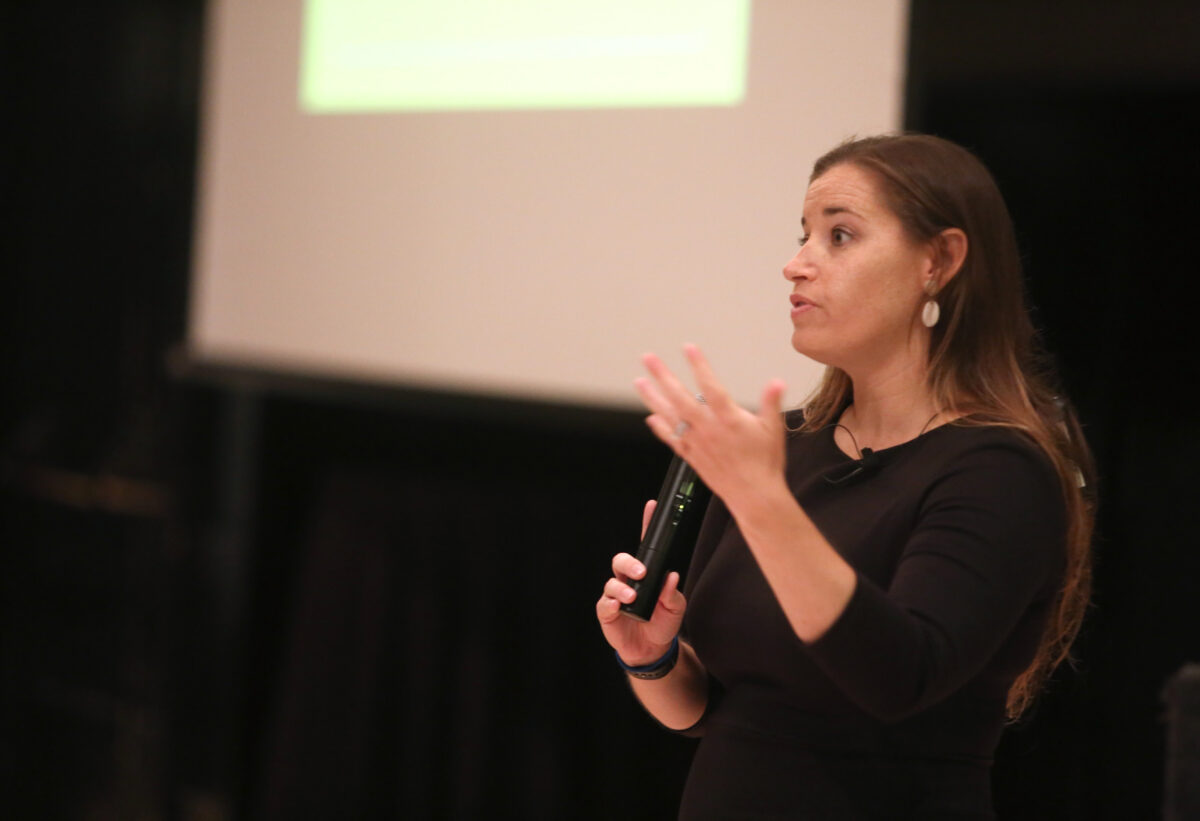Sifting through misinformation to get to the real story
- CMA CONFAB: The midterm elections are on the horizon, and college journalists must grapple with reaching their audiences while sifting through misinformation along the campaign trail. This session aims to provide tips on how to navigate the political free-for-all while getting down to the issues.
- ORGANIZER: Fredrick Batiste, College Media Association, vice president, member training
- SPEAKER: Lynn Walsh, assistant director Trusting News
- WHEN: Friday, Sept. 30, 2022 via Zoom meeting

By Jacob Mielke
with Mallory Floyd and Alexis McCune
In an effort to inform college media students and advisers about regaining trust in the media in a heated election season, the College Media Association held its first Confab of the year on Sept. 30, with guest speaker Lynn Walsh, assistant director of Trusting News.
“The whole media landscape and understanding of how news works is not necessarily something that people know. We have to keep that in mind as we are talking to consumers and as we are producing content. We have a responsibility to educate them on how it works and talk about what we do that sets us apart,” said Walsh, whose organization is devoted to teaching people how to decide what news to trust and teaching journalists how to build trust with their readers.
And teaching journalists and journalism educators how to build trust remained her focus during the Confab.
Confab organizer and CMA Vice President of Member Training Fredrick Batiste said learning how to build trust with readers was exactly what he wanted the discussion to focus on.
“The topic choice came in discussion with Education Committee members on topics that membership and their students will likely face during the academic year,” Baptiste said. “The committee thought it would be timely to discuss covering elections and dealing with misinformation since we’re weeks away from midterms and other important state and local races.”
Walsh met all those goals as she reminded the audience, of some 13 students and advisers in the virtual meeting, that news is now only a touch of a finger away and, because of this, journalistic integrity to not provide misinformation is essential to gain the trust of consumers. Walsh, an Emmy award-winning journalist, reminded attendees the responsibility to separate misinformation from ethical journalism is that of the journalists themselves.
Walsh said it was important for producers of the news to understand where consumers receive information.. She said, if the goal is to provide ethical news to as many individuals as possible, journalists need to be on the same platforms as their audiences — primarily, at least for younger audiences — that means on mobile devices.
Walsh said, “Think about where you consume news, and that is where you should work to publish your content.”
The human aspect of news, especially in politics, can be lost when speaking to others while trying to inform them of misinformation they see as fact.
“We want to debunk things, but don’t want to make people feel stupid or silly in the process,” Walsh said.
Further, the words journalists use strongly affect how readers take in the information they just read. Walsh suggested that college journalists, and all journalists, should evaluate who their target audience is, then speak directly to that audience.
“We should commit to fueling curiosity and not polarization. Some ways to do that is by avoiding over generalizations and not talking with the most extreme views,” Walsh said.
Walsh said that partly due to this polarization, trust in the news has been declining for years and hit its lowest point in 2016. According to Gallup News, it has since bounced back, sitting at around 36% in 2021. Walsh said, the trust in news is not anywhere any of us who work in journalism would be happy about and confidence in the media has hit an all-time low at 11% for television news and 16% for newspapers.
Readers who already have their minds made up, on either end of the spectrum, make writing a story a challenge but the ones in the middle are the most difficult — and the most desirable — to write for. They could end up leaning one way or the other based on the story they read.
While overall trust continues to decline, local news remains a more trusted source when compared to national news. Knight Foundation statistics show that six out of 10 Americans have more trust in local than national news.
“Local news tends to have more trust than national, but not always,” she said.
Walsh also discussed the political divide in the media, a divide that becomes even more relevant as the midterms elections approach in a month. “Republicans tend to have a lower trust in news than Democrats,” Walsh said.
According to a 2022 Gallup poll, only 5% of Republicans and 12% of independents have confidence in newspapers, a record low for these party groups. Democrats’ confidence in newspapers rose to the 42% to 46% range during the Donald Trump administration but fell when President Joe Biden took office according to Gallup. Overall, according to a 2021 poll, 68% of Democrats trust mass media a great deal or fair amount ‘more’ compared to 11% of Republicans.
The amount of information individuals have access to is constantly growing and can be difficult to navigate, making it difficult to find ethical and responsible news sources. Walsh suggested that the journalists should take their factual information and deliver it in a way that the consumer can understand.
Walsh said, “When people don’t trust ethical, responsible news outlets … and when people don’t feel they can turn to those organizations for news and for information, that’s when they are more likely to potentially get swept up and believe misinformation and disinformation, rumors and people who just throw out information online.”
According to Batiste, the session exceeded expectations. “Lynn Walsh brings so much knowledge on the topic, and the audience was eager to engage and ask questions.”
Jacob Mielke is a sophomore in mass communication at Midwestern State University (Wichita Falls, Texas)
Mallory Floyd is a junior in pre-nursing at Midwestern State University (Wichita Falls, Texas)
Alexis McCune is a sophomore in pre-nursing at Midwestern State University (Wichita Falls, Texas)

